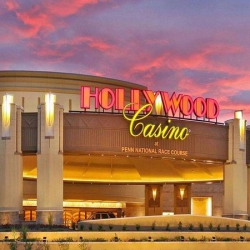
Yoe is near enough to the Pennsylvania-Maryland border that it closes out other developers in that part of the state.
Penn National Gaming submitted the winning bid of $50.1 million in a blind auction to determine which Pennsylvania casino license operator would have first choice of a location for a Category 4 mini-casino. Penn National has two days to secure their victory by writing a check-in-full to the Pennsylvania Treasury Department.
Category 4 mini-casinos are better known as satellite casinos, which were legalized in an October 2017 Pennysylvania budget bill. Blind bidding was held Wednesday morning of all the casino license holders in Pennsylvania.
The bid came as a surprise to the executives and officials involved in the bidding process. Penn National launched a lawsuit the day before to stop the land-based casino expansion, claiming “significant and unique” harm to Hollywood Casino, Penn National’s already-existing casino in Harrisburg.
Yoe Casino Winning Bid
Penn National is concerned that the 25-mile radius set by the satellite casino bill is too small for casino operations in rural areas. While overlap of radii in urban centers like Philadelphia and Pittsburg assure that no new casinos will be built within 127 miles and 95 miles of those population centers, Penn National says that a new competitor just outside the 25-mile radius around Harrisburg could cannibalize up to 50% of their casino’s customer base.
After the bid took place, Penn National announced its Category 4 casino would be build in the vicinity of Yoe, Pennsylvania. Yoe is a 33.8 miles from Harrisburg, so the distance between the two cities creates an added buffer zone. According to rules of the auction, Penn National can build a new casinos within a 10-mile radius of Yoe, so the new casino might be closer to 40 or 45 miles away from the Hollywood Casino.
Eric Schippers on Satellite Casino Process
The Yoe casino has the ability to hold between 300 and 750 casinos, plus 30 gaming tables, if Penn National spends another $2.5 million to secure a license to operate table games. Eric Schippers, the SVP of Public Affairs for Penn National Gaming, told the Pennsylvania press, “We’re happy to be the winning bidder. However, as reflected by our pending Federal lawsuit against the Cat4 provisions in the Gaming Act, we’re not happy to have to be in the situation of paying this much to help protect our flank at Hollywood Casino.
“The Gaming Act put us in the perverse position of having to essentially bid against ourselves to protect our market share in Central Pennsylvania. Nonetheless, we think the area we’ve selected will provide us the best opportunity to play both defense and offense in terms of maximizing our combined investment in Pennsylvania and we’ll be seeking to generate incremental value for our shareholders.”
The decision to bid $50 million for a new casino in those circumstances is, despite the shock of onlookers, a business decision, to assure no one builds a casino in the same region. The new casino acts as a firewall to construction elsewhere in the region, saving the gaming company millions upon millions of dollars each year. Yoe is 50 miles from Baltimore, Maryland, while it is 104 miles from Philadelphia (which has significant coverage already). Most importantly, Yoe is between 12 to 15 miles from the Pennsylvania border, so its positioning locks out other developers who want to build along the road to Baltimore.
Penn National’s $50.1 Million Bid
Penn National Gaming now has until January 12 to write a check for $50.1 million to the State of Pennsylvania. If it does not, then the bid will be thrown out and the next-highest bid will win the auction. The next round of bidding happens on January 24, with the same process playing out.
The statutory minimum limit for a bid was $7.5 million. Penn National went well above any projection made for the first round of bidding, though it is good news for the taxpayers of Pennsylvania. It shows that the casino operators in Pennsylvania are awash in cash, though Penn National Gaming has pitted itself as a small operator facing pressure from much larger gaming corporations. Of course, Penn National just spent $2.4 billion to buy Pinnacle Entertainment, so it is hardly a small operator.
Pennsylvania has 12 current brick-and-mortar casino operators, while the satellite casino expansion bill called for 10 new mini-casinos at maximum. A couple of the 12 casino operators had limitations on which type of customers they could accept, forcing gamblers who did not have a hotel room to spend $100 to gamble inside the location. Those restrictions were lifted, providing a significant boon for the existing casino, though the operator cannot participate in the mini-casino bidding process.
